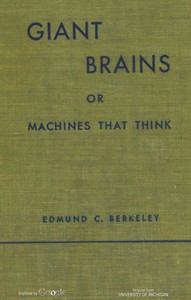Giant brains; or, Machines that think by Edmund Callis Berkeley
"Giant Brains; or, Machines That Think" by Edmund Callis Berkeley is a scientific publication written in the late 1940s. The book delves into the evolution and functionality of early computers, proposing the notion that these machines can perform tasks akin to human thinking. It discusses various types of computing machines, their significance in advancing knowledge, and explores the implications of computers in society. At the start of the book, the author outlines
the purpose and scope of the text, emphasizing the advent of machines capable of complex calculations and reasoning. Berkeley introduces the concept of mechanical brains, describing how they process and manage information with remarkable efficiency, often surpassing human capabilities. The opening portion sets the stage for deeper discussions on the design of specific machines, the nature of thinking, and the future foundations of intelligent machinery. (This is an automatically generated summary.)
Read or download for free
| How to read | Url | Size | |||
|---|---|---|---|---|---|
| Read now! | https://www.gutenberg.org/ebooks/68991.html.images | 810 kB | |||
| EPUB3 (E-readers incl. Send-to-Kindle) | https://www.gutenberg.org/ebooks/68991.epub3.images | 3.8 MB | |||
| EPUB (older E-readers) | https://www.gutenberg.org/ebooks/68991.epub.images | 3.8 MB | |||
| EPUB (no images, older E-readers) | https://www.gutenberg.org/ebooks/68991.epub.noimages | 300 kB | |||
| Kindle | https://www.gutenberg.org/ebooks/68991.kf8.images | 4.1 MB | |||
| older Kindles | https://www.gutenberg.org/ebooks/68991.kindle.images | 4.1 MB | |||
| Plain Text UTF-8 | https://www.gutenberg.org/ebooks/68991.txt.utf-8 | 555 kB | |||
| Download HTML (zip) | https://www.gutenberg.org/cache/epub/68991/pg68991-h.zip | 4.0 MB | |||
| There may be more files related to this item. | |||||
About this eBook
| Author | Berkeley, Edmund Callis, 1909-1988 |
|---|---|
| Title | Giant brains; or, Machines that think |
| Original Publication | United States: John Wiley & Sons,1949. |
| Note | Reading ease score: 61.8 (8th & 9th grade). Neither easy nor difficult to read. |
| Contents | Can machines think? what is a mechanical brain? -- Languages: systems for handling information -- A machine that will think: the design of a very simple mechanical brain -- Counting holes: punch-card calculating machines -- Measuring: Massachusetts Institute of Technology's differential analyzer no. 2 -- Accuracy to 23 digits: Harvard's IBM automatic sequence-controlled calculator -- Speed, 5000 additions a second: Moore School's ENIAC (Electronic Numerical Integrator and Calculator) -- Reliability, no wrong results: Bell Laboratories general-purpose relay calculator -- Reasoning: the Kalin-Burkhart logical-truth calculator -- An excursion: the future design of machines that think -- The future: machines that think, and what they might do for men -- Social control: machines that think, and how society may control them -- Supplements: Words and ideas. Mathematics. References. |
| Credits | Tim Lindell and the Online Distributed Proofreading Team at https://www.pgdp.net (This book was produced from images made available by the HathiTrust Digital Library.) |
| Language | English |
| LoC Class | QA: Science: Mathematics |
| Subject | Computers -- Popular works |
| Category | Text |
| EBook-No. | 68991 |
| Release Date | Sep 14, 2022 |
| Copyright Status | Public domain in the USA. |
| Downloads | 388 downloads in the last 30 days. |
| Project Gutenberg eBooks are always free! | |

